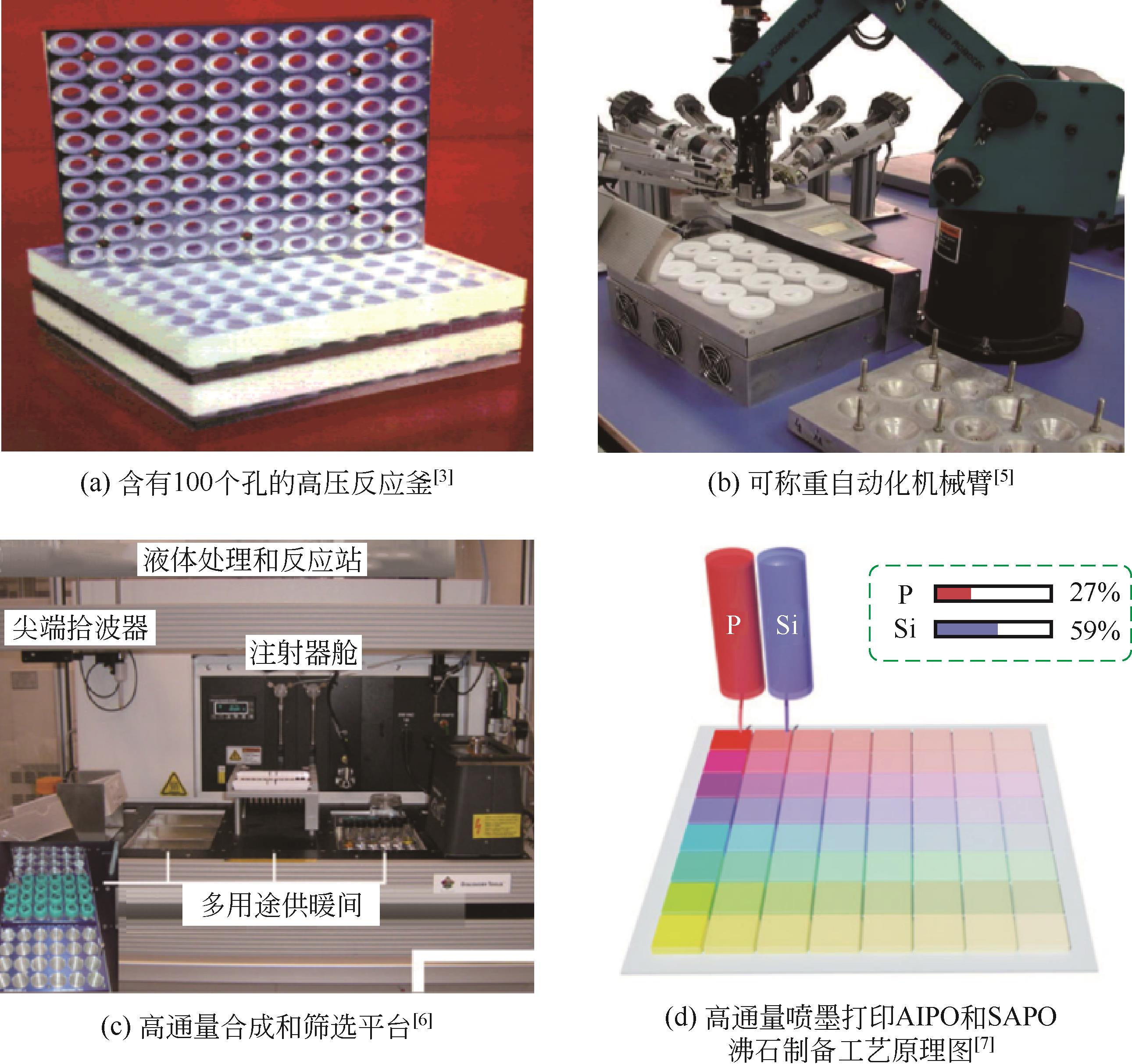| 1 |
MO Yiming, RUGHOOBUR Girish, NAMBIAR Anirudh M K, et al. A multifunctional microfluidic platform for high-throughput experimentation of electroorganic chemistry[J]. Angewandte Chemie International Edition, 2020, 59(47): 20890-20894.
|
| 2 |
MI Zhenrui, LU Tingting, ZHANG Jianan, et al. Synthesis of pure silica zeolites[J]. Chemical Research in Chinese Universities, 2022, 38(1): 9-17.
|
| 3 |
AKPORIAYE Duncan E, DAHL Ivar M, KARLSSON Arne, et al. Combinatorial approach to the hydrothermal synthesis of zeolites[J]. Angewandte Chemie International Edition, 1998, 37(5): 609-611.
|
| 4 |
VAN DE WATER Leon G A, VAN DER WAAL Jan C, JANSEN Jacobus C, et al. Ge-ZSM-5: The simultaneous incorporation of Ge and Al into ZSM-5 using a parallel synthesis approach[J]. The Journal of Physical Chemistry B, 2003, 107(38): 10423-10430.
|
| 5 |
MOLINER M, SERRA J M, CORMA A, et al. Application of artificial neural networks to high-throughput synthesis of zeolites[J]. Microporous and Mesoporous Materials, 2005, 78(1): 73-81.
|
| 6 |
JANSSEN K P F, PAUL J S, SELS B F, et al. High-throughput preparation and testing of ion-exchanged zeolites[J]. Applied Surface Science, 2007, 254(3): 699-703.
|
| 7 |
CHEN Xutao, LI Zhinian, CHEN Yu’ang, et al. High-throughput synthesis of AlPO and SAPO zeolites by ink jet printing[J]. Chemical Communications, 2023, 59(15): 2157-2160.
|
| 8 |
BANERJEE Rahul, PHAN Anh, WANG Bo, et al. High-throughput synthesis of zeolitic imidazolate frameworks and application to CO2 capture[J]. Science, 2008, 319(5865): 939-943.
|
| 9 |
FAN Chuan, WANG Lirong, LUO Yong, et al. Cost-effective screening of antimicrobial performance of multiple metal-organic frameworks via a droplet-based batch synthesis platform[J]. ACS Sustainable Chemistry & Engineering, 2022, 10(19): 6476-6482.
|
| 10 |
FAN Chuan, LUO Yong, TIAN Meng, et al. Integrated microsystem toward high-throughput automated green synthesis and Raman enhancement performance screening of noble-Metal@Cu-MOF[J]. Advanced Functional Materials, 2023, 33(11): 2211845.
|
| 11 |
Sylwia GŁOWNIAK, Barbara SZCZĘŚNIAK, CHOMA Jerzy, et al. Advances in microwave synthesis of nanoporous materials[J]. Advanced Materials, 2021, 33(48): 2103477.
|
| 12 |
WU Xiaofei, BAO Zongbi, YUAN Bin, et al. Microwave synthesis and characterization of MOF-74 (M=Ni, Mg) for gas separation[J]. Microporous and Mesoporous Materials, 2013, 180: 114-122.
|
| 13 |
MOOSAVI Seyed Mohamad, CHIDAMBARAM Arunraj, TALIRZ Leopold, et al. Capturing chemical intuition in synthesis of metal-organic frameworks[J]. Nature Communications, 2019, 10: 539.
|
| 14 |
The Ky VO, LE Van Nhieu, YOO Kye Sang, et al. Facile synthesis of UiO-66(Zr) using a microwave-assisted continuous tubular reactor and its application for toluene adsorption[J]. Crystal Growth & Design, 2019, 19(9): 4949-4956.
|
| 15 |
TADDEI Marco, STEITZ Daniel Antti, VAN BOKHOVEN Jeroen Anton, et al. Continuous-flow microwave synthesis of metal-organic frameworks: A highly efficient method for large-scale production[J]. Chemistry: A European Journal, 2016, 22(10): 3245-3249.
|
| 16 |
Roman MORSCHHÄUSER, KRULL Matthias, KAYSER Christoph, et al. Microwave-assisted continuous flow synthesis on industrial scale[J]. Green Processing and Synthesis, 2012, 1(3): 281-290.
|
| 17 |
SHANG Luoran, CHENG Yao, ZHAO Yuanjin. Emerging droplet microfluidics[J]. Chemical Reviews, 2017, 117(12): 7964-8040.
|
| 18 |
WU Qirui, WANG Xiaohong, LIU Jinfeng, et al. Effect of additives on the growth of HKUST-1 crystals synthesized by microfluidic chips with concentration gradient[J]. Biomicrofluidics, 2020, 14(3): 034110.
|
| 19 |
WU Songting, XIN Zhong, ZHAO Shicheng, et al. High-throughput droplet microfluidic synthesis of hierarchical metal-organic framework nanosheet microcapsules[J]. Nano Research, 2019, 12(11): 2736-2742.
|
| 20 |
TAN Liangxiao, TAN Bien. Hypercrosslinked porous polymer materials: Design, synthesis, and applications[J]. Chemical Society Reviews, 2017, 46(11): 3322-3356.
|
| 21 |
BAI Yang, WILBRAHAM Liam, SLATER Benjamin J, et al. Accelerated discovery of organic polymer photocatalysts for hydrogen evolution from water through the integration of experiment and theory[J]. Journal of the American Chemical Society, 2019, 141(22): 9063-9071.
|
| 22 |
GREENAWAY R L, SANTOLINI V, BENNISON M J, et al. High-throughput discovery of organic cages and catenanes using computational screening fused with robotic synthesis[J]. Nature Communications, 2018, 9: 2849.
|
| 23 |
ZHANG Zihao, SCHOTT Jennifer A, LIU Miaomiao, et al. Prediction of carbon dioxide adsorption via deep learning[J]. Angewandte Chemie International Edition, 2019, 58(1): 259-263.
|
| 24 |
WANG Song, LI Yi, DAI Sheng, et al. Prediction by convolutional neural networks of CO2/N2 selectivity in porous carbons from N2 adsorption isotherm at 77 K[J]. Angewandte Chemie International Edition, 2020, 59(44): 19645-19648.
|
| 25 |
XIE Tian, GROSSMAN Jeffrey C. Crystal graph convolutional neural networks for an accurate and interpretable prediction of material properties[J]. Physical Review Letters, 2018, 120(14): 145301.
|
| 26 |
HU Jianbo, CUI Jiyu, GAO Bin, et al. Machine-learning-assisted exploration of anion-pillared metal organic frameworks for gas separation[J]. Matter, 2022, 5(11): 3901-3911.
|
| 27 |
MOLINER Manuel, Yuriy ROMÁN-LESHKOV, CORMA Avelino. Machine learning applied to zeolite synthesis: The missing link for realizing high-throughput discovery[J]. Accounts of Chemical Research, 2019, 52(10): 2971-2980.
|
| 28 |
BURGER Benjamin, MAFFETTONE Phillip M, GUSEV Vladimir V, et al. A mobile robotic chemist[J]. Nature, 2020, 583(7815): 237-241.
|
| 29 |
ZHAO Haitao, CHEN Wei, HUANG Hao, et al. A robotic platform for the synthesis of colloidal nanocrystals[J]. Nature Synthesis, 2023, 2(6): 505-514.
|
| 30 |
ZHU Qing, ZHANG Fei, HUANG Yan, et al. An all-round AI-Chemist with a scientific mind[J]. National Science Review, 2022, 9(10): nwac190.
|
| 31 |
JIANG Yibin, SALLEY Daniel, SHARMA Abhishek, et al. An artificial intelligence enabled chemical synthesis robot for exploration and optimization of nanomaterials[J]. Science Advances, 2022, 8(40): eabo2626.
|
| 32 |
EPPS Robert W, BOWEN Michael S, VOLK Amanda A, et al. Artificial chemist: An autonomous quantum dot synthesis bot[J]. Advanced Materials, 2020, 32(30): 2001626.
|
 ), YIN Pengyuan1,2, YANG Zhenglu1,2, MO Yiming1,2, CUI Xili1,2, SUO Xian1,2(
), YIN Pengyuan1,2, YANG Zhenglu1,2, MO Yiming1,2, CUI Xili1,2, SUO Xian1,2( ), XING Huabin1,2
), XING Huabin1,2
 ), 殷鹏远1,2, 杨证禄1,2, 莫一鸣1,2, 崔希利1,2, 锁显1,2(
), 殷鹏远1,2, 杨证禄1,2, 莫一鸣1,2, 崔希利1,2, 锁显1,2( ), 邢华斌1,2
), 邢华斌1,2




